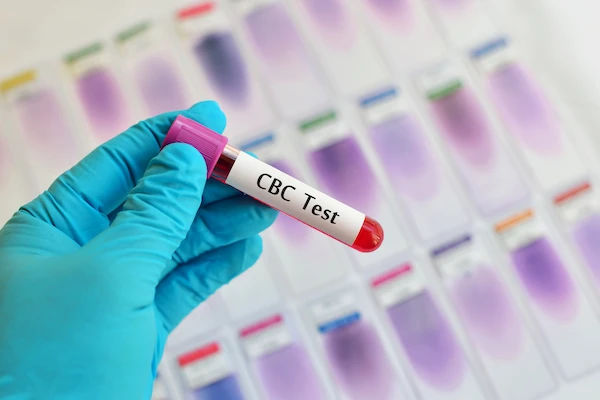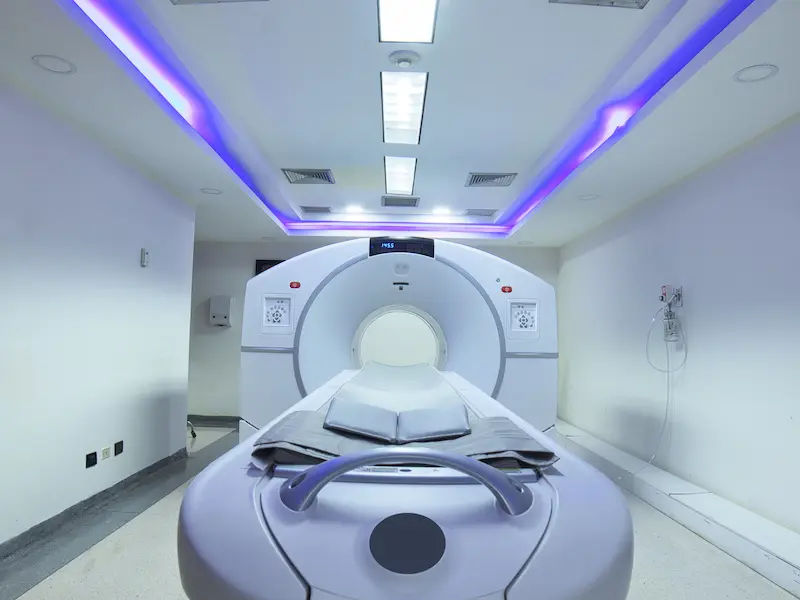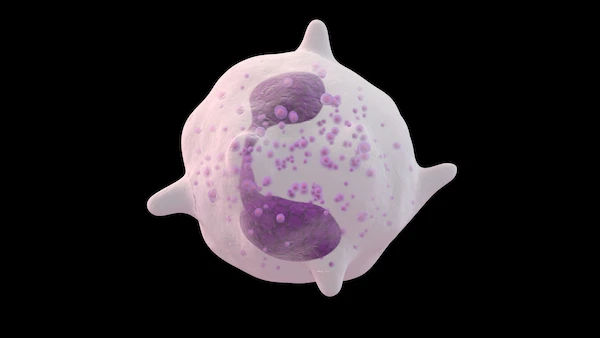Your Complete Guide to the CBC Test: Understanding Your Blood Count Results
Know about the CBC test, types of cells, why the test is required, symptoms, breakdown of test, what the test range means and limitations and more.

Written by Dr. Siri Nallapu
Reviewed by Dr. Dhankecha Mayank Dineshbhai MBBS
Last updated on 9th Sep, 2025

Your blood is a complex river of life, carrying oxygen, fighting infections, and preventing excessive bleeding. But how do you know if this vital system is functioning correctly? The answer is the Complete Blood Count test, or CBC, one of the most common and informative blood tests ordered by doctors. It’s a fundamental tool that provides a crucial snapshot of your overall health. This guide will walk you through everything you need to know, from why it's done and what it measures to how to interpret those numbers on your results sheet.
What is a Complete Blood Count (CBC) Test?
A Complete Blood Count (CBC) is a common blood test that measures and evaluates the cells that circulate in your blood. Think of it as a population census for your bloodstream. The test primarily focuses on three types of cells: red blood cells, which carry oxygen; white blood cells, which fight infection; and platelets, which help with clotting. By counting and analysing these cells, a CBC test can screen for a wide range of disorders, including anaemia, infection, inflammation, bleeding disorders, and even blood cancers.
Consult a General Physician for Personalised Advice
The Three Main Cell Types Measured
The power of the CBC test lies in its comprehensive nature, breaking down the key components of your blood:
1. Red Blood Cells (RBCs): These are the most abundant cells, responsible for transporting oxygen from your lungs to the rest of your body and bringing carbon dioxide back to the lungs to be exhaled.
2. White Blood Cells (WBCs): These are the soldiers of your immune system. There are several types (neutrophils, lymphocytes, etc.), each with a specialised role in defending against invaders like bacteria, viruses, and fungi.
3. Platelets (PLT): These are tiny cell fragments that are essential for blood clotting. They rush to the site of an injury to form a plug and stop bleeding.
Why Would You Need a CBC Test? Common Reasons and Symptoms
Doctors order a CBC count for a variety of reasons, ranging from routine assessment to investigating specific symptoms. It's a versatile diagnostic tool.
Routine Health Screening and Check-ups
- As part of your annual physical exam, a doctor will often include a CBC test to establish a baseline for your health. This baseline is invaluable because it allows for comparison in the future. Even if you feel perfectly healthy, a CBC can detect hidden problems, such as asymptomatic anaemia or early signs of a condition, before you experience any symptoms.
Diagnosing a Medical Condition
If you've been feeling unwell, a CBC is one of the first tests a doctor will use to pinpoint the cause. Common symptoms that might lead to a CBC test include:
- Persistent fatigue, weakness, or dizziness (potential anaemia)
- Fever, body aches, or swelling (potential infection or inflammation)
- Unexplained bruising or bleeding (potential platelet disorder)
- Signs of inflammation or suspected autoimmune disorders
Monitoring an Existing Condition
- If you have been diagnosed with a blood-related disorder like anaemia, a clotting problem, or an infection, your doctor will use regular CBC tests to monitor your condition and see how well you are responding to treatment. For patients undergoing chemotherapy, which affects blood cell production, frequent CBCs are critical for managing care.
Breaking Down the CBC Test: What Each Parameter Means
A standard CBC report can look intimidating with its list of acronyms and numbers. Here’s a breakdown of the key components.
Red Blood Cell (RBC) Count and Related Indices
This part of the CBC test assesses how well your body is delivering oxygen.
- Haemoglobin (Hb): This is the iron-rich protein inside RBCs that actually carries the oxygen. It's a direct measure of your blood's oxygen-carrying capacity. Low levels indicate anaemia.
- Hematocrit (Hct): This measures the percentage of your total blood volume that is made up of red blood cells. For example, a hematocrit of 40% means that 40% of your blood is RBCs.
- MCV, MCH, MCHC (Red Cell Indices): These indices describe the size and haemoglobin content of your RBCs. They are crucial for determining the type of anaemia. For instance, a low MCV means the cells are smaller than normal (microcytic), often seen in iron deficiency, while a high MCV means they are larger (macrocytic), often seen in vitamin B12 deficiency.
White Blood Cell (WBC) Count and Differential
The WBC count measures the total number of white blood cells. A "differential" breaks this total down into the specific types, which is like identifying the different branches of your military.
- Neutrophils: The first responders to bacterial infections. A high count typically suggests a bacterial infection.
- Lymphocytes: Key players in fighting viral infections and in long-term immunity. Elevated levels are common in viral infections.
- Monocytes, Eosinophils, Basophils: These other types can be elevated in specific conditions, such as parasitic infections, allergic reactions, or certain chronic diseases.
Platelet Count (PLT)
- This is a simple count of the platelets in your blood. A low count (thrombocytopenia) can lead to easy bruising and bleeding, while a very high count (thrombocytosis) may increase the risk of blood clots.
Understanding Your CBC Test Results: Normal Ranges and What They Mean
It's important to remember that "normal" ranges can vary slightly between labs based on the equipment used. Your doctor will interpret your results in the context of your age, sex, and overall health.
What Does a Low RBC Count (Anaemia) Indicate?
It indicates:
- Low levels of RBCs, haemoglobin, or hematocrit define anaemia. The red cell indices (MCV) help determine the cause:
- Low MCV (Microcytic Anaemia): Often caused by iron deficiency or thalassemia.
- High MCV (Macrocytic Anaemia): Often caused by vitamin B12 or folate deficiency.
- Normal MCV (Normocytic Anaemia): Can be caused by recent blood loss, chronic disease, or kidney problems.
Decoding High and Low White Blood Cell Counts
- High WBC Count (Leukocytosis): This is most commonly a sign that your body is fighting an infection, often bacterial. It can also be elevated in inflammatory conditions, and, in rare cases, leukaemia. Low WBC Count (Leucopenia): This can make you more susceptible to infections. It can be caused by certain viral infections, autoimmune diseases, or as a side effect of medications like chemotherapy.
How to Prepare for and What to Expect During a CBC Test
One of the best features of a CBC test is that it typically requires no special preparation, such as fasting. You can usually eat and drink normally beforehand. However, always follow your doctor's specific instructions, as sometimes the CBC is ordered alongside other tests that do require fasting.
The procedure itself is quick and straightforward. A phlebotomist will clean a spot on your arm (usually the inside of the elbow), place an elastic band (tourniquet) around your upper arm to make the veins more visible, and insert a small needle to draw a vial of blood. You may feel a brief prick or sting.
Beyond the Basics: Limitations and Further Testing
While incredibly useful, a CBC is a screening tool, not a definitive diagnostic tool. It points towards possibilities but rarely provides a final answer on its own. For example, a high WBC count confirms an immune response but doesn't identify the specific germ causing it. Similarly, anaemia confirmed by a CBC test requires further investigation to find its root cause, such as additional tests for iron, vitamin B12, or folate levels. Your doctor will use the CBC results as a map, guiding them toward the need for more specific tests to reach a precise diagnosis.
Conclusion
The Complete Blood Count test is a window into the intricate workings of your body. By providing a detailed count of your blood's essential cells, it offers invaluable clues about your overall health, from your energy levels and immune strength to your body's ability to heal. Understanding what a CBC test measures and what those numbers might indicate empowers you to be an active participant in your healthcare journey. If your CBC report shows any abnormalities or if you've been experiencing persistent symptoms like fatigue or frequent infections, don't hesitate to seek professional medical advice.
Consult a General Physician for Personalised Advice
Consult a General Physician for Personalised Advice

Dr. Mohammed Kamran
General Practitioner
5 Years • MBBS, FIDM
Nashik
Apollo 24|7 Clinic - Maharashtra, Nashik

Dr. Jawwad Mohammed Kaleem
General Practitioner
4 Years • MBBS
Hyderabad
Apollo 24|7 Clinic, Hyderabad

Dr. Chaithra H
General Physician/ Internal Medicine Specialist
6 Years • MBBS, MD General Medicine, DNB General Medicine
Bangalore
Apollo 24|7 Clinic - Karnataka, Bangalore

Dr. M L Ezhilarasan
General Practitioner
6 Years • MBBS
Visakhapatnam
Apollo 24|7 Clinic - Andhra Pradesh, Visakhapatnam

Dr. Siri Nallapu
General Practitioner
5 Years • MBBS
Hyderabad
Apollo 24|7 Clinic, Hyderabad
Consult a General Physician for Personalised Advice

Dr. Mohammed Kamran
General Practitioner
5 Years • MBBS, FIDM
Nashik
Apollo 24|7 Clinic - Maharashtra, Nashik

Dr. Jawwad Mohammed Kaleem
General Practitioner
4 Years • MBBS
Hyderabad
Apollo 24|7 Clinic, Hyderabad

Dr. Chaithra H
General Physician/ Internal Medicine Specialist
6 Years • MBBS, MD General Medicine, DNB General Medicine
Bangalore
Apollo 24|7 Clinic - Karnataka, Bangalore

Dr. M L Ezhilarasan
General Practitioner
6 Years • MBBS
Visakhapatnam
Apollo 24|7 Clinic - Andhra Pradesh, Visakhapatnam

Dr. Siri Nallapu
General Practitioner
5 Years • MBBS
Hyderabad
Apollo 24|7 Clinic, Hyderabad
Frequently Asked Questions
Do I need to fast before a CBC test?
No, for a standalone CBC test, fasting is not required. You can eat and drink normally. However, if your doctor has ordered additional tests (like a blood glucose or cholesterol test) along with the CBC, you may be instructed to fast.
What is a normal CBC range?
Normal ranges can vary by age, sex, and the laboratory's reference standards. A typical adult normal range might be:
RBC: 4.5 - 5.9 million cells/mcL
Hemoglobin: 13.5 - 17.5 g/dL (men); 12.0 - 15.5 g/dL (women)
Hematocrit: 41% - 50% (men); 36% - 44% (women)
WBC: 4,500 - 11,000 cells/mcL
Platelets: 150,000 - 450,000/mcL
Your lab report will always list its specific normal reference range.
Can a CBC detect cancer?
CBC can sometimes show findings that suggest the possibility of a blood cancer, such as leukaemia or lymphoma (e.g., extremely high or low counts of abnormal-looking cells). However, it cannot definitively diagnose cancer. A bone marrow biopsy or other specialised tests are needed for a confirmed cancer diagnosis.
What does it mean if my MPV is high?
MPV (Mean Platelet Volume) measures the average size of your platelets. A high MPV means your body is producing larger, younger platelets. This can happen after a blood loss or be a sign of a condition where platelets are being destroyed rapidly.
How long does it take to get CBC results?
In most cases, results from a CBC test are available very quickly, often within a few hours to 24 hours, depending on the lab.




